Earlier this week, my attention was drawn to this article on New York Magazine by Adam Tinworth. As I was reading through it, it really resonated with me. It might be the fact that I am getting -digitally- old, but I was feeling something along the same lines last week. I got my first access to the real internet back in 1994. (I did visit BBS’s before, but though that was computer communication, it was not the same. 😉 ) Back then, I used to spend days behind my screen as it gave me a window to a whole brave new world. It connected me to people around the globe, some of whom I am still in touch with today. I spent countless hours chatting on IRC -Internet Relay Chat-, I browsed FTP sites around the globe, often ending up downloading programs, documents, images and so on from vague networks often ending on .fi being hosted by universities. And I browsed and browsed and browsed. The way you would end up in a hoge store or an expo and you want to see everything that was there. Gopher was a guide back then, or news groups, or even rudimentary search engines with categories.
As an explorer, I stepped up my game, building small sites on nothing in particular and reading and commenting on forums and blogs. Some ten years go, the whole social sphere triggered the same exploration possibilities but much more relational as I connected to many others. And I was pulled into the world of startups where we worked on the development of startups that were wild, weird and often not very viable. Until marketeers found their audience online and the experience changed. And now we are in this world that I can only compare to the heart of a tourist center in an otherwise empty city. Everybody circles the same venues and does the same things. The triggers are similar and as the revenue models favour previously proven methods, startups are becoming more and more similar.
The way I look at it is that we need to find that underground guide to the underdeveloped areas. It is getting harder to find the niches, the dimly lit spaces where viability is not measured but shrugged at for the sake of the challenge and the fun it brings. Right now, it is as if Columbus would have said: “Yes, I will go and explore the new world, but I’ll stick to the sailing routes which have proven to give us the best return on investment.” We would never have discovered anything…
I agree with this article. If we cannot predict what the future will look like in 2030 (which is only 13 years away), how can we assume that we can create a knowledge base that our kids will definitely need in 13 years time? Will translation software have killed language barriers by then? Will maths, spelling, coding and lots of ‘technical’ skills be replaced by software or AI that supports us? And if that is the case, what are the things our kids should really excel at if not relationships, curiosity, agility, creativity and empathy?
(If not to say that I strongly believe that the fact that we have almost all knowledge at our fingertips, is killing our creativity. Having everyone at digital arms length is killing interaction. And as all of that becomes more impersonal, we slowly grow unaccustomed to initiating change through vision, having change change us instead.)
We need to get out there and dream. We need to get out there and be passionate about the things we want to achieve. And that is something we should teach our children more than anything else. Though the world might have been explored on the map, life is -and never will be- explored to the fullest. There will always be something more, something extra, something new to build, to explore, to enjoy.
 I just came across the Oil City Aftermath. A short video on the story of a small city that became huge in oil and then fell apart as the oil companies left. I have seen the effects with my own eyes and even back in 2001 did some street photography there to document the demise when I visited my friends there.
I just came across the Oil City Aftermath. A short video on the story of a small city that became huge in oil and then fell apart as the oil companies left. I have seen the effects with my own eyes and even back in 2001 did some street photography there to document the demise when I visited my friends there.
To me, the story of Oil City is one of many towns and cities and one that will be repeated over and over in the near future. With the rise of automation in jobs and daily life, this is closer to us than we think. And we need to step up to rethink who we are and what we are as cities. I think Judith Etzel formulates it very well in this video when she says: “This is what can happen to a community if you don’t diversify, if you are not open to new ideas, if you can’t think outside the box, if you can’t be innovative.”
That is why we need to step up. We need to rethink cities as set entities, but regard them as fluid. And as water takes different routes to get somewhere, the flow of jobs, income, identity, relationships and everything that shapes a city needs to change course continually. We need to be ready for that, now and in our near future, because so much is changing. Look at retail, look at care, look at the upscaling of businesses, look at automation, at the sharing economy, at augmented and virtual reality. These are things that are going to shape our future if we don’t shape our future to incorporate these things to serve us.
Nobody wants cities to decline, retail areas to be empty and businesses to close. But it is up to us to reshape our cities into vibrant communities where we embrace change, where we work with it to improve our standards of living as a community. But we need to do that now and we need to do that continually.
Oil City Aftermath from Danny Yarnell on Vimeo.
So, right now, I am at an event about the future of work. And I realized that I have a lot more ideas about the future than I write about. So, my challenge for the coming months is to talk about the future of work, companies and more.
Ready, set, go!
Ik snap het niet. Of ja, ik snap het wel. (De financiële wereld ligt natuurlijk ook het dichtst bij de belevingswereld van Minister Dijsselbloem.) Maar als het hele startup Delta plan zo met pensioen gaat met Neelie Kroes, dan heeft Dijsselbloem nu blijkbaar besloten dat Nederland zich op fintech moet storten. Het artikel zegt ook: “Vooral de Verenigde Staten, het Verenigd Koninkrijk en China lopen voorop.” Dus kiezen we als Nederland weer enthousiast de achterstandspositie. Wij moeten als fintech land achter de grote jongens aan, want het bancaire verkeer is belangrijk voor ons. En dat moet gestimuleerd gaan worden met maatregelen die ook niet bijster origineel zijn: “Vooral de bankvergunning light, afgekeken van de Britten, ziet hij als een kans.”
Ik kan me niet voorstellen dat de keuze, om een branche te kiezen waarin anderen al voorlopen, er toe gaat leiden dat Nederland daarin toonaangevend gaat worden in de wereld. Maar misschien ben ik op dat vlak te pessimistisch… Volgens mij kunnen we beter iets pakken waar we goed en uniek in zijn. Dan kunnen we daarop een goede toekomst bouwen. Waar is de logistiek bijvoorbeeld? Waar zijn de bloemen, het water, de handel? Waar zijn de segmenten waarin nog weinig gebeurt, zoals de circulaire economie?
Ik heb altijd geleerd dat als je wilt leiden, je beter het voortouw kunt nemen. Als je vanuit de achterhoede moet komen, dan moet je wel met hele grote innovaties komen om de koplopers voorbij te streven. Nou hebben we wel heel veel innovatiekracht in Nederland, maar ik zou toch liever in de voorhoede starten dan de rest te volgen.
You don’t want to know how many people have come up to me and told me: “Hey, I just heard they stopped Google Glass” target=”_blank”>Google Glass. See, I said it all along, that kind of stuff will never catch on.” And they all did it with a smug smile that communicated that they were sure that people would turn away from this tech folly and go back to life as usual. In fact, only last week, I asked a group of people to think about what the future might hold for their jobs in 2025. An impossible assignment, I know. And one of them, a young woman, looked at the group and said: “I think people will turn from social networks and go back to talking to each other more.” Part of the group sighed with relief as there are many people that would love to see that happen. But I doubt it. For one, technology is here to stay. Just as we are not going to move away from central heating to an open wood fire in the middle of our living room, we are not going to step back from new technology. Why? Because it would just be a step back in the way we are living our lives.
Lets just be honest. We are so used to having everyone literally at arms’ length. Reach for your phone and you can talk to your friends, exchange messages, catch up with what they have been doing and share your own stories. I doubt that principle is going to change. The way we experience it will change though. The big question is how we are going to be integrating technology into our daily reality. We have seen a lot of talk about the internet of things. Though I like the idea of my fridge talking to my shopping list, that does not sound like the tech enabled future that we can all get excited about. In fact, in a survey held by Affinnova back in November 2014, 92% said it is difficult for them to say what an IoT (Internet of Things) enabled product needs to have for them to purchase it. However, they do say that they will recognize it when it is there. For me the essence of that survey is that IoT is not something we dream about. It is like water, we use it, but we don’t really appreciate it.
I believe that there is more. Much more. Stuff that we can dream about. A couple of months ago, I visited NuFormer‘s Virtual Reality Experience Center. I had tried the Oculus Rift” target=”_blank”>Oculus Rift before, but these guys took it to a new level. As I stood on level ground in a square space, the projection had me jumping from stone to stone and precariously balancing myself not to fall off into the vast sea of hot lava beneath me. (No, I don’t have video of that.) I was amazed at how much this system could trick all of my senses into being in a completely different place. Even though my mind could still recall that I was in that room, my body was definitely jumping those stones. I was doubtful a year and a half ago, but my body did not doubt this experience.
However, I don’t really see us stuck to huge glasses and a battery backpack as we go through life. Granted, this will change over time, but still. And then last Friday Magic Leap posted a short video about a day at their office. This is an interesting video in that they have chosen an interesting mix between virtual reality and augmented reality. I mean, when fighter robots make holes in your ceiling and come for you, that goes a bit beyond regular augmented reality.
Robots aside, I can see technology as demonstrated by Magic Leap enter our world. I personally am not much of a fan of games where opponents need to be shot, but I can imagine incredible fun for kids with a setup like this and a version of Kinectimals on steroids. But moving away from the games, imagine working with this on a daily basis. No more screen restrictions and all your stuff literally at your fingertips. When the technology making that possible isn’t too intrusive on your experience of daily life, this opens up endless possibilities. Teaching biology by showing the animals close up. Running tests for new products without having to produce them first. Interacting with every day objects which enhance your experience. I think there is much to be said for this. And I am interested where this will take us.
Oh, and obviously I would love to sit down with you to hear your opinion about this. Or you could leave it in the comments and we can discuss it here. Or on social networks, or Skype or… or…
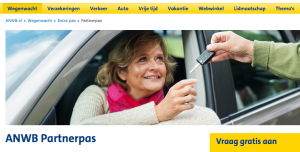 Een poosje geleden begon de ANWB een actie rondom de ANWB Partnerpas. Mijn eerste gedachte was dat we eindelijk niet meer afhankelijk waren van waar de pas was, maar dat we allebei konden profiteren van de €140 die we elk jaar aan deze fijne vereniging overmaken. We zijn tenslotte ook in gemeenschap van ANWB lidmaatschap getrouwd. Of tenminste, dat dacht ik.
Een poosje geleden begon de ANWB een actie rondom de ANWB Partnerpas. Mijn eerste gedachte was dat we eindelijk niet meer afhankelijk waren van waar de pas was, maar dat we allebei konden profiteren van de €140 die we elk jaar aan deze fijne vereniging overmaken. We zijn tenslotte ook in gemeenschap van ANWB lidmaatschap getrouwd. Of tenminste, dat dacht ik.
De week na mijn aanvraag viel onze nieuwe partnerpas op de mat. Verheugd opende ik de envelop om de pas aan mijn vrouw te geven, toen mij iets opviel. De ANWB vind mijn vrouw helemaal geen volwaardig partner. Hoewel we al 14 jaar samen gezellig de premie overmaken, ziet de ANWB mijn vrouw als een nieuw lid. Een glimmend blauwe pas staarde mij aan vanaf de brief. Overduidelijk verward door mijn gezichtsuitdrukking, leek de glans er ook een beetje af te gaan. Teleurstelling aan beide kanten. Zelfs het nummer is niet hetzelfde. Hoewel mijn vrouw en ik als een eenheid worden gezien door de staat, de kerk, de buurt, onze familie, blijkt dit voor de ANWB niet te gelden.
 Natuurlijk klim ik dan in de telefoon, want ik wil natuurlijk dat mijn vrouw ook al een volwaardig betaler van onze premie gezien wordt. Een vriendelijke stem aan de andere kant van de telefoon legt mij uit dat het systeem alleen maar toelaat dat mijn vrouw als nieuw lid wordt ingevoerd. Vandaar de nieuwe pas. Na wat aandringen beseft zij ook dat dat eigenlijk vreemd is. Ik kan me voorstellen dat de pas alleen geldt voor de gezinsauto. Dat is voor ons overigens prima. Wat ik niet snap, is dat haar hiermee ook de mogelijkheid ontzegd wordt om te profiteren van alle voordelen die het gouden lidmaatschap ons zou brengt. Zij mag dus weer helemaal vanaf 0 beginnen en als ze naar de ANWB winkel wil, dan moet ze toch weer mijn pas meenemen. Dat vind ik toch vreemd.
Natuurlijk klim ik dan in de telefoon, want ik wil natuurlijk dat mijn vrouw ook al een volwaardig betaler van onze premie gezien wordt. Een vriendelijke stem aan de andere kant van de telefoon legt mij uit dat het systeem alleen maar toelaat dat mijn vrouw als nieuw lid wordt ingevoerd. Vandaar de nieuwe pas. Na wat aandringen beseft zij ook dat dat eigenlijk vreemd is. Ik kan me voorstellen dat de pas alleen geldt voor de gezinsauto. Dat is voor ons overigens prima. Wat ik niet snap, is dat haar hiermee ook de mogelijkheid ontzegd wordt om te profiteren van alle voordelen die het gouden lidmaatschap ons zou brengt. Zij mag dus weer helemaal vanaf 0 beginnen en als ze naar de ANWB winkel wil, dan moet ze toch weer mijn pas meenemen. Dat vind ik toch vreemd.
ANWB, kunnen jullie nou geen beter excuus bedenken dan “het systeem kan het niet”? Natuurlijk kan ik me voorstellen dat het een hoop gedoe is om een extra persoon toe te voegen aan een lidmaatschapssysteem waarin blijkbaar elke naam een uniek nummer heeft. Dat kan wat werk opleveren. Maar zorg er dan tenminste voor dat het aantal lidmaatschapsjaren overeenkomt met de werkelijkheid. Want nu komt het over alsof mijn vrouw nooit heeft bestaan voor jullie. (Dat is duidelijk ook zo, maar dat hoeven jullie niet zo duidelijk te laten merken.)
Mocht u nou ook nadenken om een partner status te koppelen aan uw product of dienst, bedenk dan eerst even wat het partnerschap precies inhoudt. Niet alleen van uw kant, maar ook vooral vanuit het standpunt van uw klant. Daarmee voorkomt u dat het lijkt alsof u een partner op een heel ander niveau neerzet dan uw klant verwacht. Daar wordt uw klant gelukkiger van. En u uiteindelijk ook.
Update:
Kort nadat ik deze blog publiceerde, kreeg ik een reactie van de ANWB. Ze blijken er over nagedacht te hebben. Of tenminste, zij vinden van wel. Ik denk daar anders over:
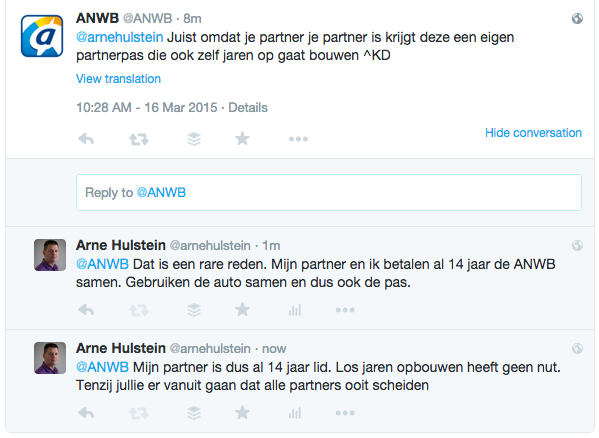
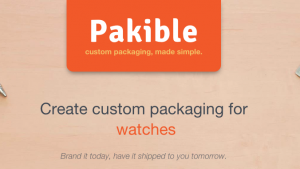 I just came across Pakible, a packaging startup. A what? Yes, a packaging startup. As more and more people are selling making and selling their own products, it does nothing for its appearance to just stick it in a brown box you found at the supermarket. That is why I am really interested in Pakible. It brands 10 boxes for you for $10. That must be a bargain. To be honest, I am kind of annoyed that they do it in the US. I thing there is lots of opportunity for something like this worldwide.
I just came across Pakible, a packaging startup. A what? Yes, a packaging startup. As more and more people are selling making and selling their own products, it does nothing for its appearance to just stick it in a brown box you found at the supermarket. That is why I am really interested in Pakible. It brands 10 boxes for you for $10. That must be a bargain. To be honest, I am kind of annoyed that they do it in the US. I thing there is lots of opportunity for something like this worldwide.
Oh, and for those of you that have read the book The 4-Hour Workweek: Escape 9-5, Live Anywhere, and Join the New Rich by Timothy Ferriss, here is another idea. Imagine combining a startup like Pakible with a drop shipping company and shipping your own product in your own branded box. That has to make you feel like Apple…
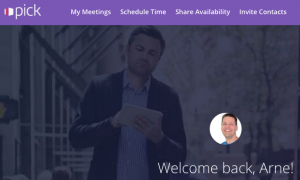 As you will know, I am always interested in meeting new people when I’ve got the time. There have been countless attempts to make that happen. Once, long ago, I even tried to build my own startup around this idea. However, I have yet to find one that is useful.
As you will know, I am always interested in meeting new people when I’ve got the time. There have been countless attempts to make that happen. Once, long ago, I even tried to build my own startup around this idea. However, I have yet to find one that is useful.
Yesterday Pick launched. It promises to make the process easier. I am interested to see what it does for me. Are you? Check when I am available at: http://pick.co/arne.hulstein
![]() Good news for Mac owners that still use iPhoto 9 and are now upgrading their Mac to Yosimite. Only last week it would still have cost you money to upgrade your iPhoto 9 version up to the newer app store version. Which is the main reason why I never did it. After all, iPhoto 9 was working fine, so there was no need. But now that I upgraded to Yosimity, all of a sudden it did not start anymore. At first I was annoyed that Apple would force me to buy the new iPhoto through not making the OS X update compatible. But when checking, the new app was now free from the app store. Nice.
Good news for Mac owners that still use iPhoto 9 and are now upgrading their Mac to Yosimite. Only last week it would still have cost you money to upgrade your iPhoto 9 version up to the newer app store version. Which is the main reason why I never did it. After all, iPhoto 9 was working fine, so there was no need. But now that I upgraded to Yosimity, all of a sudden it did not start anymore. At first I was annoyed that Apple would force me to buy the new iPhoto through not making the OS X update compatible. But when checking, the new app was now free from the app store. Nice.
Doet het basisonderwijs buiten de Randstad er nog wel toe voor de PO-Raad, de sectorraad voor het basisonderwijs in Nederland. Of tenminste, ik dacht tot nog toe dat de PO-raad de sectorraad was voor heel Nederland. Maar vanochtend las ik met verbazing de uitspraak van de voorzitter van de PO-raad, Rinda den Besten, op nos.nl. Naar aanleiding van het sluiten van 100 scholen in heel Nederland legde ze een duidelijke scheiding tussen de Randstad -het deel van Nederland dat er blijkbaar toe doet- en de rest van Nederland.
Tegenover de NOS verklaart zij over het sluiten van scholen in dorpen:
“Die dorpen liggen vooral in de krimpgebieden. In Noord-Groningen, Zeeland en Limburg. Daar is de leerlingendaling het grootst. Dat betekent dat er dus meer basisscholen verdwijnen of moeten samenwerken.
Maar ook de Randstad, en het midden van het land krijgen er nu mee te maken. “Het komt dichterbij”, zegt Den Besten.”
Over het algemeen een prima uitspraak, wat mij betreft, maar dat laatste “Het komt dichterbij” schoot bij mij wel even verkeerd. Alsof je het over iets hebt dat tot nu toe helemaal geen enkele relatie heeft gehad tot het werk van de sectorraad voor het basisonderwijs. Pas nu het langzaam naar de Randstad toe kruipt “komt het dichterbij”. Het klinkt als iets engs dat het basisonderwijs besluipt vanuit donkere uithoeken. Was het daar gebleven, dan had niemand er last van gehad, maar nu “komt het dichterbij”. Laten we zeggen dat dit mij op zijn minst zorgen baart voor de manier waarop de PO-raad kijkt naar de belangen van het basisonderwijs buiten de randstad.
 Everybody knew this was coming and most people didn’t even buy into webOS at the beginning. But the final word is out. HP is retiring its webOS for HP mobile devices on the 15th of January 2015. The app store will still be open until November 1st and updates can be submitted until the 10th. HP promises the device will still work after the 15th of January 2015, but you can no longer retrieve a lost password. Which might be tricky.
Everybody knew this was coming and most people didn’t even buy into webOS at the beginning. But the final word is out. HP is retiring its webOS for HP mobile devices on the 15th of January 2015. The app store will still be open until November 1st and updates can be submitted until the 10th. HP promises the device will still work after the 15th of January 2015, but you can no longer retrieve a lost password. Which might be tricky.
Anyway, the end of an ill fated era. Lots of people didn’t really believe the Palm phone series would work, and as a self fulfilling prophesy they sure didn’t. HP says it is now 3 years after they sold their last device and it is time to end the whole thing. Interestingly, webOS now has been openSourced and is apparently sponsored by LG that uses it in their smart TV’s. So, there might be an opening there for that handful of Palm owners. They might still be able to watch some TV on their devices.

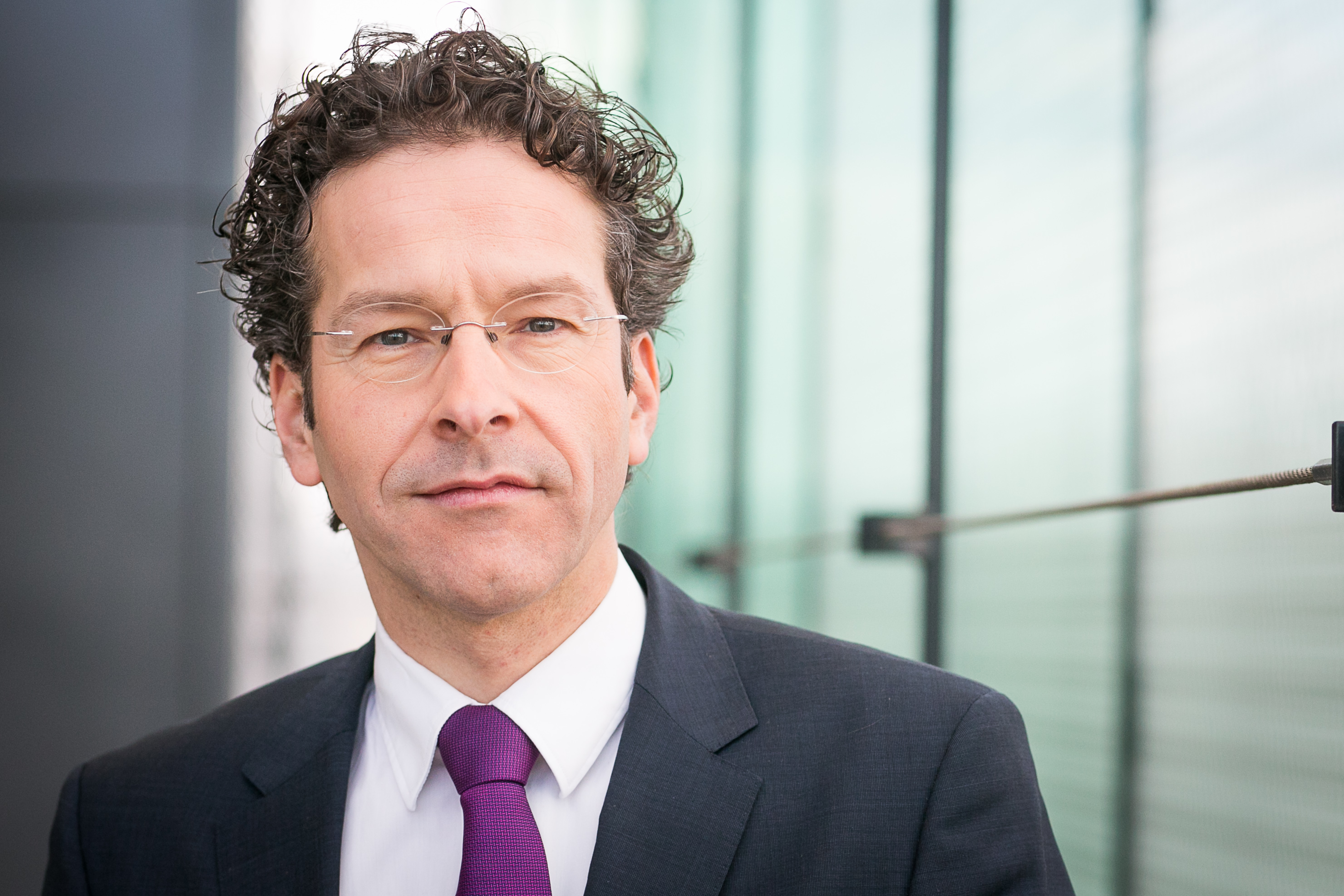
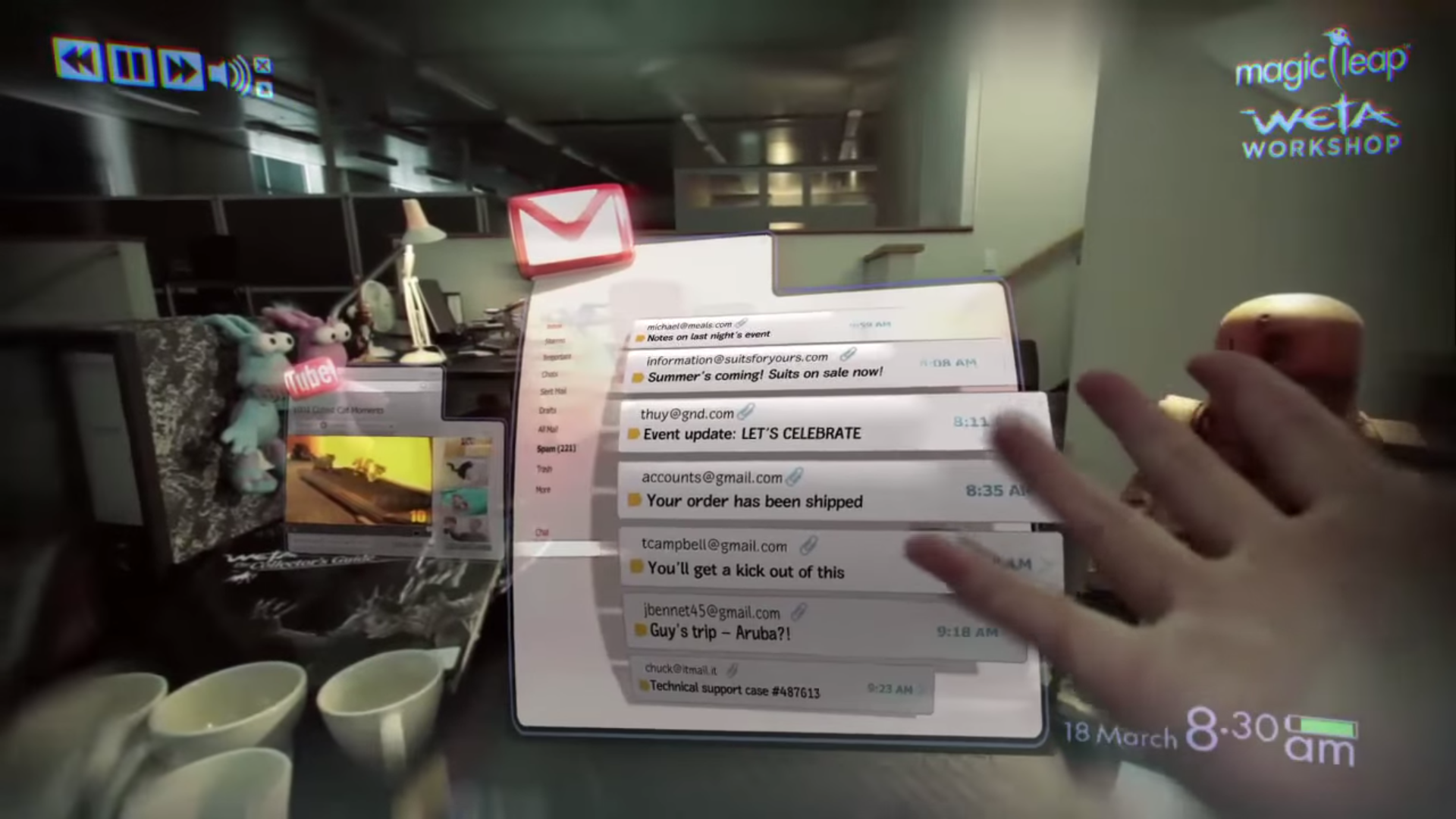
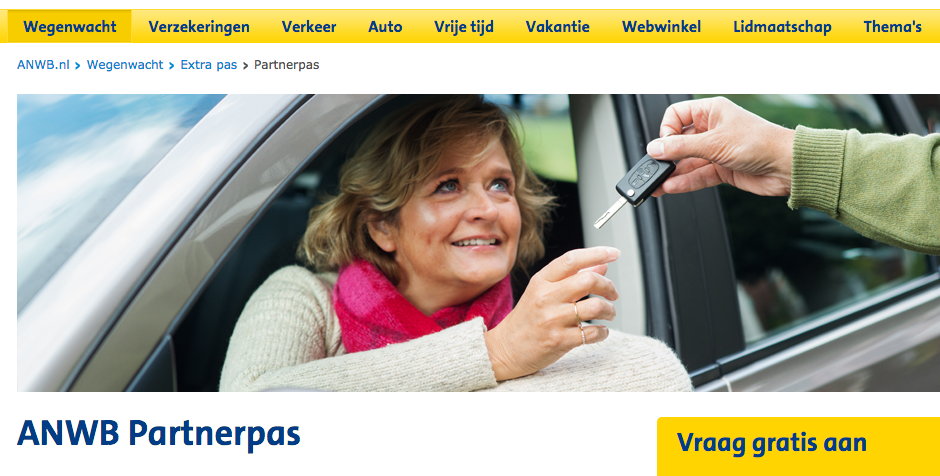
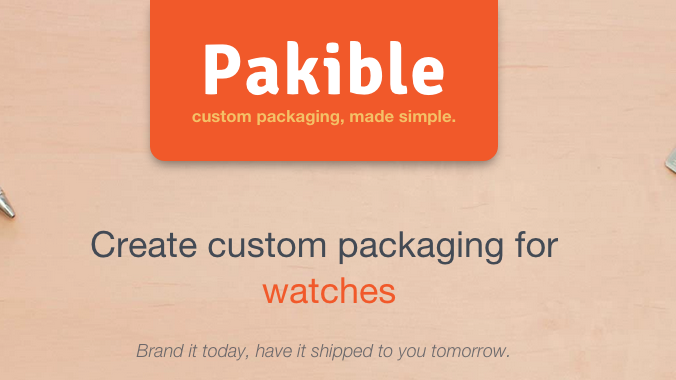
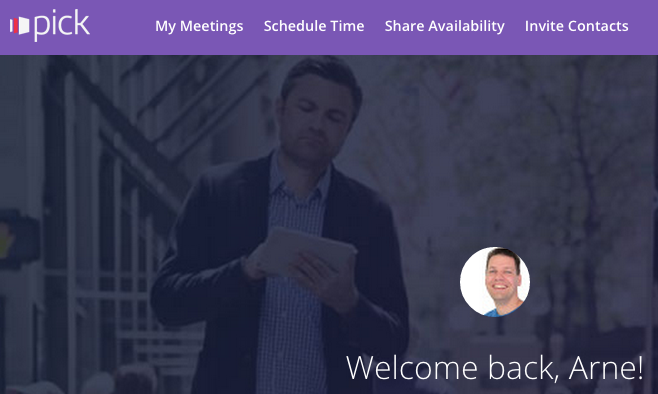

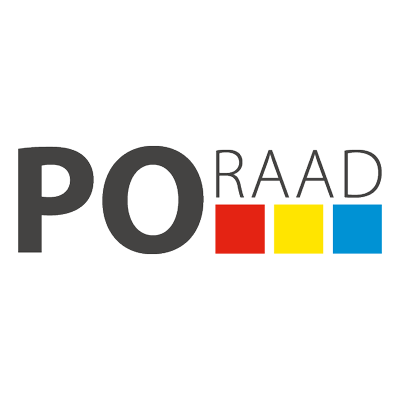
 I love the future. I have loved it ever since I started reading. Technology is shaping our future fast. Back in 1985 I wrote my first computer program. Back in 1994 I launched my first website and I have been working with organizations on integrating new technology ever since.
I love the future. I have loved it ever since I started reading. Technology is shaping our future fast. Back in 1985 I wrote my first computer program. Back in 1994 I launched my first website and I have been working with organizations on integrating new technology ever since.